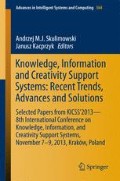Abstract
Based on previous work (Assimakopoulos et al. Proceedings of KICSS’2013 [5]) where we introduced HelpMe tool, a tool that automatically selects a group of people according to rules and metrics, we now introduce inconsistency between divergent ranking concerning answers during collaborative tasks among experts. In HelpMe tool, users collaboratively create a knowledge base about a subject and evaluate user opinions in order to achieve quality of knowledge. The basic assumption of the tool is that “Knowledge comes from experts.” This is achieved by collective evaluation, through voting and discussion in every stage (Task) of the discussion (Activity). Inconsistency appears when a set of sentences cannot be true at the same time (Adrian et al. Proceedings of KICSS’2013 [3]). During collaborative tasks in Communities of Practice, inconsistency may inspire new associations and lead to more interesting solutions. However, there are cases such as medical, legal, etc. issues in which contradicting views are not helpful since a final decision has to be made. This paper is focused on such cases and examines the possible options and the methods that have to be implemented in order for a final decision to be made. When difference in the evaluation range is observed (divergent voting), the community should be informed in order to evaluate the existing answer with an “up vote” or a “down vote.” No other option is available. In case of inconsistency, we introduce a loop procedure that informs experts in order to evaluate the task being observed as inconsistent. If inconsistency remains, or the number of evaluators is small, the process keeps going until it meets the criteria introduced in this paper. On the other hand, the system should be able to find, in its knowledge database, related conversations and examines the decisions made on related or same subject.
Access this chapter
Tax calculation will be finalised at checkout
Purchases are for personal use only
References
Ackerman, M.S., McDonald, D.W.: Answer Garden 2: merging organizational memory with collaborative help. In: Ackerman, M.S. (ed.) Proceedings of the ACM Conference on Computer Supported Cooperative Work, Computer Supported Cooperative Work, pp. 97–105. Boston, ACM Press, New York (1996)
Ackerman, M.S., Wulf, V., Pipek, V.: Sharing Expertise: Beyond Knowledge Management. MIT Press, Cambridge, MA (2002)
Adrian, W.T., Nalepa, J.G., Ligeza, A.: On potential usefulness of inconsistency in collaborative knowledge engineering. In: Skulimowski, A.M.J. (ed.) Proceedings of KICSS’2013. Progress & Business Publishers, Kraków, pp. 14–25 (2013)
Aouiche, K., Lemire, D., Godin, R.: Collaborative OLAP with Tag Clouds: Web 2.0 OLAP Formalism and Experimental Evaluation, WEBIST, Madeira, Portugal (2008)
Assimakopoulos, D., Tzagarakis, M., Garofalakis, J.: Communities of practice for developers: HelpMe tool. In: Andrzej M.J. Skulimowski (ed.), Proceedings of KICSS’2013. Progress & Business Publishers, Kraków, pp. 26–37 (2013)
Atkinson, K., Bench-Capon, T., McBurney, P.: PARMENIDES: facilitating deliberation in democracies. Artif. Intell. Law 14(4), 261–275 (2006)
Bielenberg, K., Zacher, M.: Groups in social software: utilizing tagging to integrate individual contexts for social navigation. Masters Thesis submitted to the Program of Digital Media, Universität Bremen (2006)
Buckingham Shum, S.: Cohere: Towards Web 2.0 Argumentation. Knowledge Media Institute, The Open University, UK (2008)
Foner, L.N.: Yenta: a multi-agent, referral based matchmaking system. In: Johnson, W.L., Hayes-Roth, B. (eds.) Proceedings of the First International Conference on Autonomous Agents, pp. 301–307. ACM Press, New York (1997)
Golder, S., Huberman, B.A.: Usage patterns of collaborative tagging systems. J. Inf. Sci. 32(2), 198–208 (2006)
Groza, T., Handschuh, S., Breslin, J.G.: Adding provenance and evolution information to modularized argumentation models. In: WI-IAT’08. IEEE/WIC/ACM International Conference, vol. 1 (2008)
Kautz, H., Selman, B., Shah, M.: Referral Web: combining social networks and collaborative filtering. Commun. ACM 40(3), 63–65 (1997)
Krulwich, B., Burkey, C.: The ContactFinder agent: answering bulletin board questions with referrals. In: Proceedings of the 13th National Conference on Artificial Intelligence and Eighth Innovative Applications of Artificial Intelligence Conference, AAAI 96, Portland, Oregon, vol. 1. AAAI Press, Menlo Park, CA, pp. 10–15 (1996)
Ricci, F., Rokach, L., Shapira, B.: Introduction to recommender systems handbook. In: Ricci, F., Rokach, F., Shapira, L., Kantor, B. (eds.) Recommender Systems Handbook, pp. 1–35. Springer, Heidelberg (2011)
Streeter, L., Lochbaum, K.: Who knows: a system based on automatic representation of semantic structure. In: Proceedings of the Conference on Computer-Assisted Information Retrieval, RIAO’88 Program Conference, Cambridge, MA, 21–24 March, pp. 380–388. CID, Paris (1998)
Tzagarakis, M., Karousos, N., Gkotsis, G., Kallistros, V., Christodoulou, S., Mettouris, C., Kyriakou, P., Nousia, D.: From ‘Collecting’ to ‘Deciding’: facilitating the emergence of decisions in argumentative collaboration. Research Academic Computer Technology Institute, N. Kazantzaki, University of Patras, 26500 Rion, Greece (2010)
Wikipedia Article Stack Overflow. http://en.wikipedia.org/wiki/Stack_Overflow (2014)
Wikipedia Article Reddit. http://en.wikipedia.org/wiki/Reddit (2014)
Zhang, J., Ackerman, M., Adamic, L.: Expertise networks in online communities: structure and algorithms. In: Proceedings of the 16th International Conference on World Wide Web, International World Wide Web Conference, Banff, Canada, 8–12 May, pp. 221–230. ACM Press, New York (2007)
Author information
Authors and Affiliations
Corresponding author
Editor information
Editors and Affiliations
Rights and permissions
Copyright information
© 2016 Springer International Publishing Switzerland
About this paper
Cite this paper
Assimakopoulos, D., Tzagarakis, M., Garofalakis, J. (2016). Need for Collective Decision When Divergent Thinking Arises in Collaborative Tasks of a Community of Practice. In: Skulimowski, A., Kacprzyk, J. (eds) Knowledge, Information and Creativity Support Systems: Recent Trends, Advances and Solutions. Advances in Intelligent Systems and Computing, vol 364. Springer, Cham. https://doi.org/10.1007/978-3-319-19090-7_25
Download citation
DOI: https://doi.org/10.1007/978-3-319-19090-7_25
Published:
Publisher Name: Springer, Cham
Print ISBN: 978-3-319-19089-1
Online ISBN: 978-3-319-19090-7
eBook Packages: Computer ScienceComputer Science (R0)

